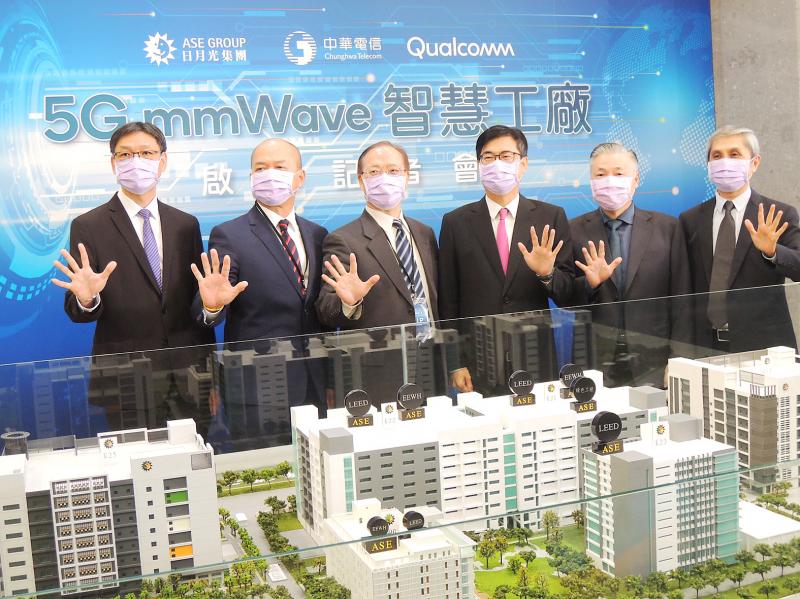ASE Technology Holding Co (ASE, 日月光投控) yesterday said it is to invest NT$94 billion (US$3.3 billion) to develop a third smart manufacturing campus in Kaohsiung after rolling out the world’s first smart factory using Qualcomm Inc’s 5G millimeter-wave (mmWave) technology.
The project is expected to create 8,600 jobs, the world’s biggest chip testing and packaging service provider said, adding that it plans to introduce the 5G mmWave technology to its new factories as well.
ASE started to upgrade its manufacturing systems 11 years ago, using fixed-line, Wi-Fi, or 4G technologies and other hardware to connect 2,000 different machines, it said.

Photo: Wang Jung-hsiang, Taipei Times
The company hopes to boost its workforce in Kaohsiung to 40,000 from 25,000 now, ASE chief executive officer Tien Wu (吳田玉) told a news conference in Kaohsiung.
Ultimately, it hopes to increase its headcount in Taiwan to 80,000, from the current 60,000, making it the biggest employer in the nation, Wu said.
ASE operates 18 smart factories in Kaohsiung, making up 20 percent of the company’s total factories in the city, Wu said.
The company aims to upgrade half of its Kaohsiung factories to smart, connected and automated facilities in the near term, he added.
It plans to add seven smart factories next year, bringing the total number to 25, he said.
Based on an initial calculation, a smart factory or highly automated factory can save 15 percent in manufacturing costs compared with traditional plants, he said.
If the economic benefits of the 5G mmWave smart factory are verified, ASE does not rule out introducing the smart manufacturing system to its existing smart factories, Wu said.
The new smart factory is to operate on a 5G mmWave private network built by Chunghwa Telecom Co (中華電信), with almost all devices and equipment sourced from local suppliers, such as Sercomm Corp (中磊), which provides small cell stations.
To facilitate the deployment of the 5G mmWave network, Qualcomm for the first time utilized engineering service resources to help its local partners overcome engineering challenges, Qualcomm Inc Taiwan and Southeast Asia president S.T. Liew (劉思泰) said.
Qualcomm’s chips — including Snapdragon X55, Snapdragon QSM5165, Snapdragon XR2 and GZX5-AR — are used in devices such as augmented reality (AR) glasses to enable smart manufacturing applications at ASE’s fab.
The introduction of 5G mmWave network helps ASE implement automatic line inspection via smart uncrewed vehicles installed with cameras, infrared sensors and microwave sensors, it said.
Combining AR technology, the 5G network significantly boosts equipment maintenance efficiency and provides a safer work environment for employees through minimal equipment contact, it said.
ASE also introduced 5G mmWave technology and AR technology to its Green Technology Education Center, at its water recycling plant in Kaohsiung, allowing visitors to immerse themselves in an interactive experience at the center.

In Italy’s storied gold-making hubs, jewelers are reworking their designs to trim gold content as they race to blunt the effect of record prices and appeal to shoppers watching their budgets. Gold prices hit a record high on Thursday, surging near US$5,600 an ounce, more than double a year ago as geopolitical concerns and jitters over trade pushed investors toward the safe-haven asset. The rally is putting undue pressure on small artisans as they face mounting demands from customers, including international brands, to produce cheaper items, from signature pieces to wedding rings, according to interviews with four independent jewelers in Italy’s main

Macronix International Co (旺宏), the world’s biggest NOR flash memory supplier, yesterday said it would spend NT$22 billion (US$699.1 million) on capacity expansion this year to increase its production of mid-to-low-density memory chips as the world’s major memorychip suppliers are phasing out the market. The company said its planned capital expenditures are about 11 times higher than the NT$1.8 billion it spent on new facilities and equipment last year. A majority of this year’s outlay would be allocated to step up capacity of multi-level cell (MLC) NAND flash memory chips, which are used in embedded multimedia cards (eMMC), a managed

Japanese Prime Minister Sanae Takaichi has talked up the benefits of a weaker yen in a campaign speech, adopting a tone at odds with her finance ministry, which has refused to rule out any options to counter excessive foreign exchange volatility. Takaichi later softened her stance, saying she did not have a preference for the yen’s direction. “People say the weak yen is bad right now, but for export industries, it’s a major opportunity,” Takaichi said on Saturday at a rally for Liberal Democratic Party candidate Daishiro Yamagiwa in Kanagawa Prefecture ahead of a snap election on Sunday. “Whether it’s selling food or

In the wake of strong global demand for AI applications, Taiwan’s export-oriented economy accelerated with the composite index of economic indicators flashing the first “red” light in December for one year, indicating the economy is in booming mode, the National Development Council (NDC) said yesterday. Moreover, the index of leading indicators, which gauges the potential state of the economy over the next six months, also moved higher in December amid growing optimism over the outlook, the NDC said. In December, the index of economic indicators rose one point from a month earlier to 38, at the lower end of the “red” light.